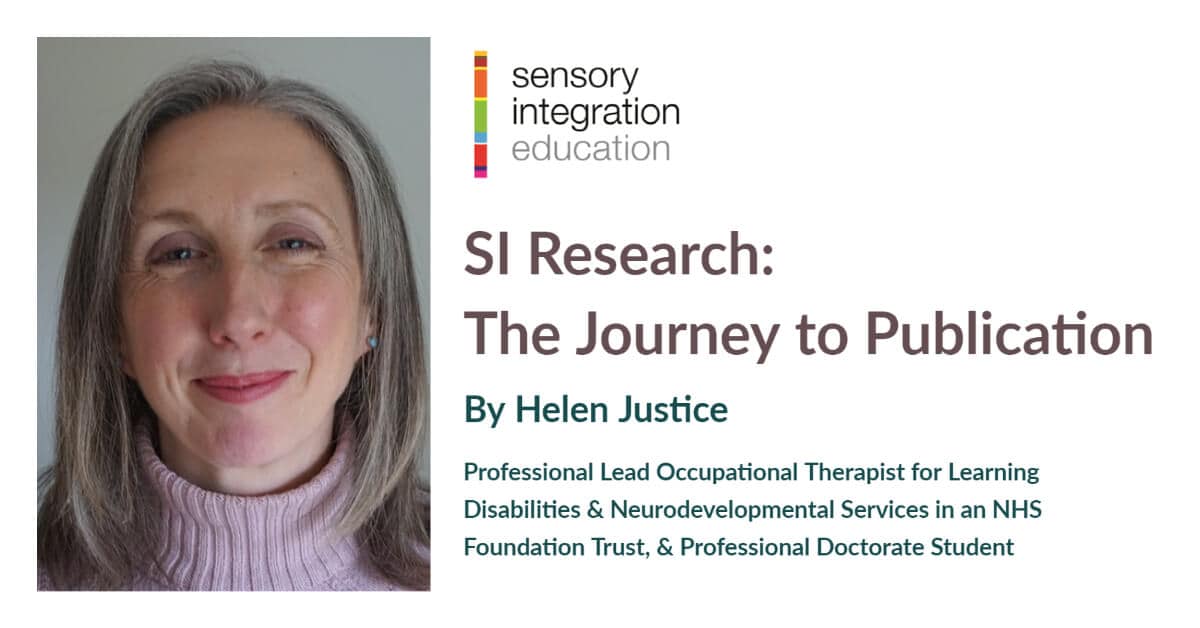SI Research: The Journey to Publication
By Helen Justice, 16 June 2021

SIE member Helen Justice writes here about her experience of conducting SI research and her journey to publication of her paper:
Helen is Professional Lead Occupational Therapist for Learning Disabilities and Neurodevelopmental Services in West Sussex at Sussex Partnership NHS Foundation Trust, and Professional Doctorate Student at the University of Chichester:
"With the recent 10-year anniversary of the Winterbourne View abuse scandal (Challenging Behaviour Foundation, 2021; United Response, 2021) it feels bitter-sweet to be sharing news about publication of my research, which examined occupational therapy for individuals with sensory processing challenges within acute assessment and treatment units. With so much work still needed to prevent people with learning or intellectual disabilities being admitted to inpatient units, it may seem strange to be researching practice within them. The frustratingly slow rate of reduction of numbers of people in-patient settings, along with a possible need for some ongoing specialist acute mental health provision for people with intellectual disabilities, however, suggests some specialist in-patient provision is likely to continue to exist – certainly for the time being. As occupational therapists are one of the professions working in these settings, I therefore feel it is vital to improve the evidence base to support provision of best possible care in this area, at the same time as improving community support to prevent people being admitted in the first place.
"I was first inspired to complete this study whilst studying part time for an MRes at the University of Brighton and working clinically on an NHS acute Assessment and Treatment Unit for adults with intellectual disabilities. Although the unit had recently been purpose-built, I hadn’t been involved in the planning of the building and was interested to see what decisions had been made about some of the facilities available, which I might have planned differently if given the opportunity. Once in post I also became aware of just how many individuals admitted had sensory processing challenges that severely impacted their quality of life and ability to engage in meaningful activities. The post was part time and I found I was having to think carefully about how I used my time most efficiently and effectively to ensure I could contribute to high quality multi-disciplinary formulation and recommendations regarding which type of accommodation and support would enable an individual to move on from us to live successfully in their own home. I found myself frequently asking questions about the most appropriate combination of assessments and interventions to use within the time restrictions available. With little evidence available to guide me, I decided to complete a Delphi study to ask experienced clinicians for their views about best practice in this area.
"The research led to creation of a list of “important items” in the areas of assessment, intervention, outcome measures, facilities, equipment, and training. Two themes were also identified from participants’ comments – “Complexity” and “Pragmatism vs Ideal World”, which highlight practice challenges in this area and the complex clinical reasoning the occupational therapists used to overcome these. My hope is that therapists working on assessment and treatment units can use the list of important items in a practical way, for example, to support funding bids for equipment and training, or to help determine how available space is used if units are being redesigned. I also hope that together with the information gathered in the themes, it will give them confidence in the skilled work they do - working creatively in a complex area; particularly in the key role they can play in discharge facilitation. In terms of future research, I hope this study supports the need for development of further assessment and intervention tools for adults with intellectual disabilities and wonder if it could also be one very small piece of the puzzle that could eventually help to inform development of an ASI® fidelity tool for this group of people. If we can improve assessment and intervention for people we can help to ensure they receive the most appropriate care and support whilst remaining in their own homes and local community.
"My final hope is to inspire other practicing clinicians to participate in research and then to go on to publish their findings. It took me four years from completing this study to achieving publication in a peer reviewed journal. Work and family demands, wholly unanticipated situations like the COVID-19 pandemic, and numerous other daily challenges can get in the way of working on drafts and making changes recommended by supervisors. However, every set back provides a learning opportunity and I’m so glad I kept going. I was unsuccessful with the first journal I submitted to and despite some very positive comments from one of the reviewers the editor decided the topic wasn’t the right fit for their journal. Although this was a disappointment, the reviewers’ comments were so helpful it really improved the article ready for submission to the journal that did go on to publish it. Likewise, some revisions were requested before the article was finally accepted in its current form. The thoughtful and informative comments from the reviewers really helped pull out some key areas to focus on and the article is certainly better for this process. So, if you are tempted to try and publish, I would definitely encourage you to give it a go. My top tip would be to do this with a more experienced writing partner. I certainly couldn’t have got to this point without the support, encouragement and wisdom of my amazing supervisors and co-authors, Dr David Haines and Dr Jon Wright."
References
Challenging Behaviour Foundation (2021) Winterbourne View: 10 Years Onhttps://www.challengingbehaviour.org.uk/news/winterbourne-view-10-years-on/
United Response (2021) Winterbourne View: 10 Years Onhttps://www.unitedresponse.org.uk/resource/easy-news-winterbourne-view/

